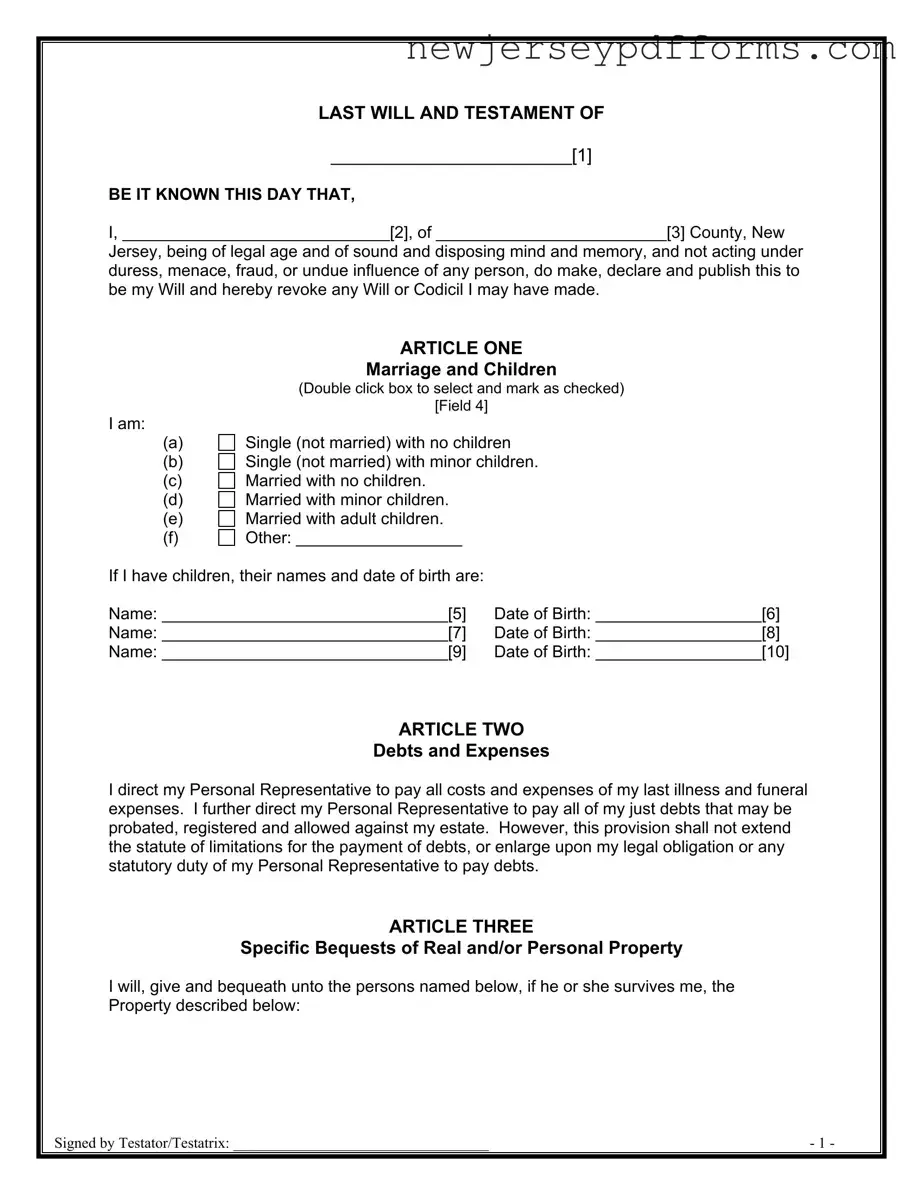What are the basic requirements for a valid will in New Jersey?
To create a valid will in New Jersey, the testator must be at least 18 years old and of sound mind. The will must be in writing and signed by the testator. Additionally, it should be witnessed by at least two individuals who are present at the same time. These witnesses must also sign the will, affirming that they saw the testator sign it or that the testator acknowledged their signature. It’s important that the witnesses are not beneficiaries of the will to avoid any potential conflicts of interest.
Can I write my will by hand in New Jersey?
Yes, New Jersey allows for handwritten wills, known as holographic wills. However, for a handwritten will to be valid, it must be signed by the testator and should clearly express the testator's intentions. While holographic wills can be enforceable, they may lead to disputes over their validity, especially if the handwriting or intentions are unclear. It's often advisable to use a formal will template or consult with a legal professional to ensure clarity and compliance with state laws.
What happens if I don’t include my spouse or children in my will?
If you do not mention your spouse or children in your will, New Jersey law provides certain protections for them. Your spouse is entitled to a share of your estate, even if they are not named in the will, unless you have a prenuptial agreement that states otherwise. Children may also have rights to your estate, particularly if they are minors. It’s crucial to consider your family dynamics and legal obligations when drafting your will to avoid potential disputes.
Is it necessary to have a personal representative appointed in my will?
Yes, appointing a personal representative (also known as an executor) is a key component of a will. This individual will be responsible for managing your estate after your death, ensuring that debts are paid, and assets are distributed according to your wishes. You can choose anyone you trust, but it’s wise to discuss the responsibilities with them beforehand. If you do not appoint someone, the court will appoint an administrator, which may not align with your preferences.
Can I change my will after it has been created?
Absolutely. In New Jersey, you can change your will at any time while you are still alive and mentally competent. This can be done by creating a new will or by adding a codicil, which is a legal document that amends your existing will. It’s important to follow the same legal requirements for signing and witnessing as you did with your original will to ensure that the changes are valid.
What should I do if my beneficiary dies before me?
If a beneficiary named in your will passes away before you, their share typically lapses unless you have included a provision that addresses this situation. Many people include a “per stirpes” clause, which allows the deceased beneficiary’s share to pass to their descendants. It’s wise to review your will periodically to make sure it reflects your current wishes and family circumstances.
How can I ensure my will is properly executed?
To ensure your will is properly executed, follow the legal requirements: sign the will in front of two witnesses who are present at the same time, and have them sign as well. Store the will in a safe place and inform your personal representative and family members where it can be found. Consider consulting with a legal professional to review your will to confirm it meets all state requirements and effectively communicates your intentions.
What if I have minor children?
If you have minor children, it's crucial to address their care in your will. You can appoint a guardian to take care of them in the event of your passing. Additionally, you may want to establish a trust to manage their inheritance until they reach adulthood. This ensures that their financial needs are met while also providing oversight on how the funds are used for their benefit. Consulting with a legal professional can help you navigate these important decisions.

